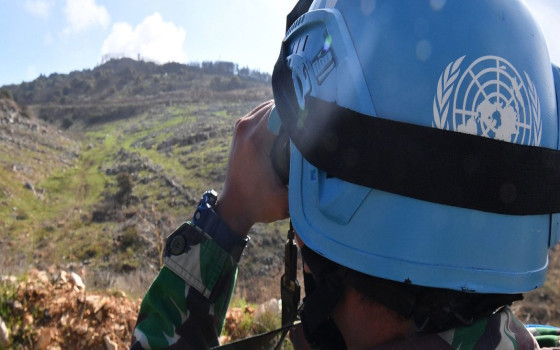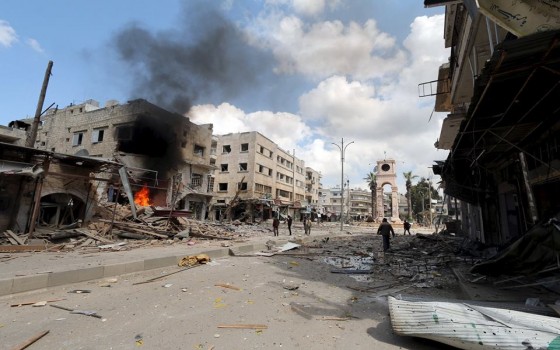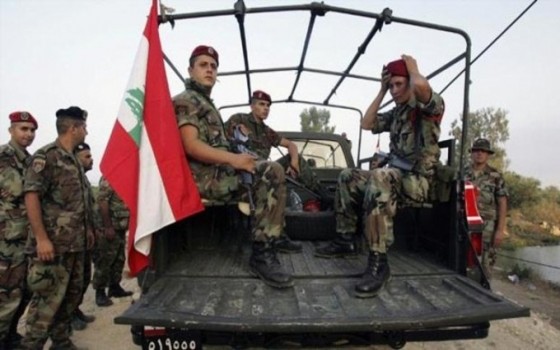
UN forces on the border strip between Israel and Lebanon "UNIFIL": We continue efforts to maintain peace despite the escalation.. More than half a million women and girls affected by the conflict

- Europe and Arabs
- Friday , 4 October 2024 11:22 AM GMT
Beirut - New York: Europe and the Arabs
Jean-Pierre Lacroix, Under-Secretary-General for Peacekeeping Operations, said that the United Nations Interim Force in Lebanon (UNIFIL) continues to do its utmost to implement its mandate granted to it by the Security Council under very difficult circumstances. He said that the members of the interim force feel that they are doing their duty towards the people of southern Lebanon, noting that all forces are currently remaining in their positions. According to the UN daily news bulletin, a copy of which we received this morning, Friday
Lacroix spoke to journalists in New York yesterday, Thursday, expressing his deep concern about the escalation of violence in southern Lebanon and its impact on civilians. He reiterated the Secretary-General's emphasis on the need to stop hostilities and return to the negotiating table.
Top priority
The UN official said that it was encouraging to hear the expressions of support for UNIFIL issued by all member states of the Security Council during the session held yesterday.
He stressed that the "UNIFIL team" remains united and committed to its mandate, expressing his deep gratitude to UNIFIL personnel and troop-contributing countries. He explained that the force is constantly reviewing the situation and has contingency plans that are constantly updated "so that we can adapt UNIFIL's position if necessary."
Lacroix added that the United Nations is in constant contact with the troop-contributing countries, and they received a briefing from the head of the UNIFIL mission and its Force Commander, General Aroldo Lazaro, from Beirut. He said that he will brief these countries today, Friday.
The UN official stressed that the safety and security of peacekeepers is a top priority, noting that a number of measures have been taken over the past months, weeks and days to enhance the protection of peacekeepers. He added: "But the safety and security of peacekeepers is a shared responsibility, and the parties have an obligation to respect the safety and security of peacekeepers."
For its part, the United Nations Population Fund expressed its deep concern about the safety and well-being of 520,000 women and girls affected by the escalation of the conflict in Lebanon since September 27, including more than 11,000 pregnant women in dire need of health care and other basic services. According to the Lebanese authorities, more than one million people have been forced to flee their homes, many leaving everything behind, including some 155,000 who have taken refuge in overcrowded collective shelters.
In this context, Leila Baker, the Regional Director of the United Nations Population Fund for the Arab States, said that the increasing violence and displacement of civilians in Lebanon is “heartbreaking.” She stressed that the disruption of essential life-saving health services for women and girls is “deeply concerning and the need to provide protection is an urgent and life-or-death matter, including for UN staff.”
Attacks on health care have killed two health workers and closed at least 37 health facilities in Lebanon since 27 September, including nine facilities supported by UNFPA, putting a strain on health facilities near displaced populations. According to the Office for the Coordination of Humanitarian Affairs, at least 25 health workers have been killed this week as a result of Israeli airstrikes.
UNFPA calls on all parties to abide by their obligations under international law to protect all civilians, civilian infrastructure, hospitals, health facilities, medical personnel and patients. “Civilians – including aid workers and health workers – are not a target, and safe and unfettered access for humanitarian supplies is vital,” he said.
The Fund said obstetric supplies it had sent to Lebanon were still stuck in customs and should be released immediately.
The Fund confirmed that some 128,000 people have crossed the Lebanese border into Syria since last Friday, arriving in the governorates of Rural Damascus, Homs and Tartous. While rapid needs assessments indicate an urgent need for a full range of emergency assistance, the Fund highlighted the health and protection needs of women and girls, which must be “at the heart of the humanitarian response.”












No Comments Found